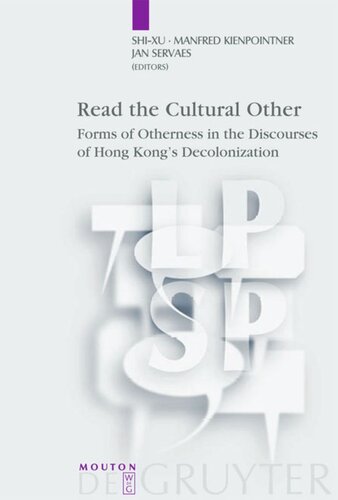

Most ebook files are in PDF format, so you can easily read them using various software such as Foxit Reader or directly on the Google Chrome browser.
Some ebook files are released by publishers in other formats such as .awz, .mobi, .epub, .fb2, etc. You may need to install specific software to read these formats on mobile/PC, such as Calibre.
Please read the tutorial at this link: https://ebookbell.com/faq
We offer FREE conversion to the popular formats you request; however, this may take some time. Therefore, right after payment, please email us, and we will try to provide the service as quickly as possible.
For some exceptional file formats or broken links (if any), please refrain from opening any disputes. Instead, email us first, and we will try to assist within a maximum of 6 hours.
EbookBell Team

4.7
26 reviewsRead the Cultural Other contains studies on non-Western discourse. It has two principal aims. Firstly, it argues that the study of non-Western, non-White, and Third-World discourses should become a legitimate, necessary, and routine part of international discourse scholarship. Hitherto, non-Western, non-White, and Third-Word discourses have been relegated and marginalized to a 'local', 'particular', or 'other' place in (or, one might argue, outside) the mainstream. To reclaim their place, the book deconstructs the rhetoric of universalism and the continued preoccupation with Western discourse in the profession, and stresses the cultural nature of discourse, both ordinary and disciplinary, as it outlines a culturally pluralist vision.
Secondly, in order to take the multicultural view seriously, it explores the complexity, diversity, and forms of otherness of non-Western discourse by examining the case of China and Hong Kong's discourses of the decolonization of the latter. Far too often, non-Western discourse has been stereotyped as externally discrete, internally homogeneous, and formally containable within a 'universal', 'general', or 'integrated' model. The present work focuses on China and Hong Kong's discourses, which have been marginalized by their Western counterparts. Through culturally eclectic linguistic analysis and local cultural analysis, it identifies and highlights the specific ways of speaking of China and Hong Kong - their concepts, concerns, aspirations, resistance, verbal strategies, etc. - with respect to similar or different issues.
The culturally pluralist view and analytical practice proffered here call for a radical cultural change in international scholarship on language, communication, and discourse.